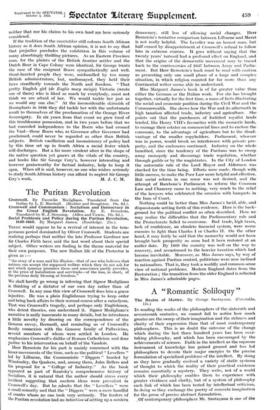The Puritan Revolution
Cromwell. By Encordio Modigliano. Translated from the Italian by L. E. Marshall. (Hodder and Stoughton. 10s. 6d.). Cromwell and Communism : Socialism and Democracy in the Great English Revolution. By E. Bernstein. Translated by H. J. Stenning. (Allen and Unwin. 10s. 6d.). Social Problems and Policy during the Puritan Revolution, 1640-1660. By Margaret James. (Routledge. 21s.).
THERE would appear to be a revival of interest in the tem- pestuous period dominated by Oliver Cromwell. Students are realizing perhaps that neither the late Professor Gardiner nor Sir Charles Firth have said the last word about their special subject. Other writers are finding in the theme material for their own purposes. The new Italian life of the Protector is given as :—
"the story of a man and his illusion—that of one who believes that nations can accept the supposed welfare which they do not ask for arid which tyranny promises them and sometimes partly provides, at the price of humiliation and servitude—of the loss, in short, of the precious daily blessing of freedom."
We shall hardly go wrong in inferring that Signor Modigliano is thinking of a dictator of our own clay rather than' of Cromwell. In any case this view of Cromwell does him a grave injustice. He was a plain Englishman trying to keep order and bring back affairs to their normal course after a cataclysm. That was Cromwell's tragedy, and perhaps only Englishmen, who detest theories, can understand it. Signor Modigliano's narrative is sadly inaccurate in many details, but he introduces a little novelty by drawing on the correspondence of the Genoese envoy, Bernardi, and reminding us of Cromwell's family connexion with the Genoese family of Pallavicino, several members of whom were settled. in London. He emphasizes Cromwell's dislike of Roman Catholicism and does justice to his intervention on behalf of the Vaudois.
Herr Bernstein for his part is mainly concerned with the lesser movements of the time, such as the political " Levellers " led by Likurne, the Communistic " Diggers " headed by Wiustanley, the Quakers, and, among them, John Bellers and his 'Proposal for a "College of Industry." As the book appeared as part of Kautslcy's comprehensive historY of Socialism, it is natural that the author should stress every incident suggesting that _modern ideas were prevalent in Cromwell's day. But he Admits that the " Levellers " were a small minority and that the " Diggers " were a mere handful of cranks whom no one took very seriously. The. leaders of the Puritan revolution had no hatentiea of setting up a mOdein democracy, still less of allowing social changes. Herr Bernstein's tentative comparison between Lilburne and Marat is not really helpful. The Leveller was an honest man, but half crazed by disappointment at Cromwell's refusal to follow him in extreme courses. It goes without saying that the twenty years' turmoil had a profound effect on England, and that the origins of the democratic movement may be traced back to the controversies of 1647 between Army and Parlia- ment. But Herr Bernstein's book must be read with caution as presenting only one small phase of a large and complex situation, in which religion counted for far more than any Continental writer seems able to understand.
Miss Margaret James's book is of far greater value than either the German or the Italian work. For she has brought together, virtually for the first time, a mass of facts illustrating the social and economic position during the Civil War and the Commonwealth. She shows how the War and its aftermath in high taxation affected trade, industry and agriculture. She points out that the purchasers of forfeited royalist lands tended, like Henry VIII's favourites with the monastic lands, to manage their estates on commercial lines and to enclose the COMT110119, to the advantage of agriculture but to the disad- vantage of the smaller copyholders. Parliament, whoever was in power, would brook no interference with private pro- perty, and the enclosures continued. Industry on the whole benefited, since the tendency of the Puritans was to sweep away monopoly and discourage trade regulation, whether through guilds or by the magistrates. In the City of London the autocratic rule of the Lord Mayor and Aldermen was checked for the time being. Efforts were made, though with little success, to make the Poor Law more helpful and effective. But social reform in one sense was not desired, and the attempt of Barebone's Parliament to reform the Common Law and Chancery came to nothing, very much to the relief of the lawyers who celebrated the occasion with banquets in the Inns of Court.
Nothing could be better than Miss James's lucid, able, and dispassionate setting forth of this evidence. Here is the back- ground for the political conflict so often described. Ikre we may realize the difficulties that the Parliamentary rule and the Protectorate failed to overcome. Bad trade, high taxes, lack of confidence, an obsolete financial system, were worse enemies to fight than Charles I or Charles II. On the other hand, it may fairly be said that the monarchy would not have brought back prosperity so soon had it been restored at an earlier date. By 1660 the country was well on the way to recovery, and accustomed to the heavier taxation which had become inevitable. Moreover, as Miss James says, by way of reaction against Puritan control, politicians were now inclined to rationalism. That is, they took a worldly and common-sense view of national problems. Modern England dates from the Restoration ; the transition from the older England is reflected in Miss James's admirable pages.




















































 Previous page
Previous page